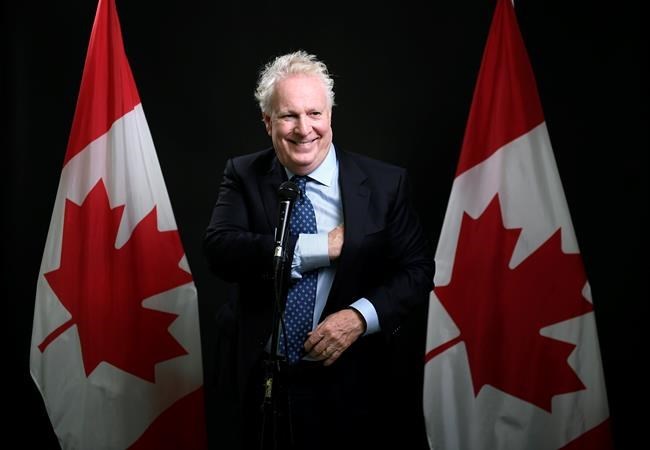
Conservative Leadership candidate Jean Charest jokes with reporters as he arrives for a media scrum after the third debate of the 2022 Conservative Party of Canada leadership race, in Ottawa, on Wednesday, Aug. 3, 2022. THE CANADIAN PRESS/Justin Tang
September 04, 2022 - 4:05 AM
OTTAWA - Jean Charest, the former premier of Quebec and a cabinet minister under Brian Mulroney, is vying to become the next leader of the federal Conservative party. Charest has positioned himself as a centrist candidate and claims he would pose the biggest threat to Prime Minister Justin Trudeau's Liberals.
Here's a look at his key policy promises:
— On health care: Charest would reform the Canada Health Act to "empower provinces to innovate in collaboration with the private sector, while maintaining our universal public health-care model." He would create a $10 billion Healthcare Infrastructure Fund for hospitals and long-term care. He would also prioritize trained health-care workers' entry into Canada. He would increase the Medical Expenses Tax Credit for seniors.
— On child care: Charest would keep the new child-care deals Trudeau negotiated with the provinces. He would add a "Choice in Childcare Tax Credit" that would refund 75 per cent of child-care expenses for lower-income families. He would extend the eligibility period for extended parental leave benefits to two years, up from 18 months, and eliminate the employment insurance clawback on up to $20,000 of income earned while on leave.
— On housing: Charest says he would tie infrastructure funding to "significant densification" near new transit built with federal money. He would create tax incentives for new multi-unit rental buildings and allow capital gains referrals for rental income invested in more rental housing. He would make the home office tax credit permanent and increase the maximum to $5,000.
— On the environment: Like other candidates, Charest would remove the federal price on carbon for consumers. He would keep industrial carbon pricing and eliminate HST on products such as electric vehicles, electric tractors, heat pumps, Energy Star appliances and high-efficiency windows. He would also introduce "Right to Repair" legislation.
— On energy: Charest would introduce an "Alberta Accord" and commit to a new equalization formula. He would repeal Bill C-69, which overhauled impact assessments for energy projects, and Bill C-48, the bill that banned large tankers along the northern coast of British Columbia. He would introduce new "National Infrastructure Corridors" and a "Federal Indigenous Opportunities Corporation" focused on Indigenous involvement in projects.
— On labour: Charest says he would create a national register for credential recognition for federally regulated workers. He would fast-track work visas and citizenship for international students who graduate from Canadian universities. He would pilot a "High Potential Tech Visa" to give professionals a path to Canada without securing a job in advance, and make it easier for skilled workers to bring spouses and children with them when they immigrate.
— On blockades: Charest would introduce a Critical Infrastructure Protection Act to designate "pipelines, utilities and telecom infrastructure, mines, energy production and refining facilities, railways, ports, interprovincial highways, border crossings, airports and other critical infrastructure" as key national infrastructure and make it an offence to blockade, trespass on or interfere with it. Police would have the authority to clear blockades without a court injunction.
— On crime: To allow earlier intervention in situations with domestic abuse, Charest would make "coercive control" a criminal offence, and fund training for police and judges on intimate partner violence. Without offering many specifics, Charest promises to reinstate mandatory minimum sentences for gun crimes, create "stronger" sentences for hate-motivated crimes and make "tougher" penalties for people who assault police officers or other first responders.
— On defence: Charest promises to increase military spending to two per cent of GDP, build up the military's regular force strength to 100,000 personnel and introduce a Canadian Armed Forces Service Benefits Act. He also promises to fix procurement, but offers no specifics.
— On supply management: Charest would keep supply management in Canada's dairy, poultry and egg sectors.
This report by The Canadian Press was first published Sept. 4, 2022.
News from © The Canadian Press, 2022